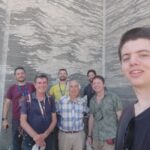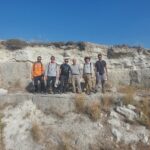
The recent increase in oil and natural gas exploration in the Mediterranean has encouraged a new and more comprehensive examination of the geological units in the region. This has allowed for a more in-depth investigation of the geological structure of Cyprus and a better understanding of the origins, evolution and potential economic values of the geological formations in the region.
The “International Mediterranean Evaporite Project”, which started four years ago, has carried out important research not only in Cyprus but also in the Mediterranean basin. Within the scope of the project that brings together 29 researchers from 10 countries, 13 universities and four different organizations, the Director of the Earthquake and Soil Research and Evaluation Center of Near East University and Head of the Department of Petroleum and Natural Gas Engineering Prof. Dr. Cavit Atalar represents Cyprus in the studies carried out on the island.
The studies carried out within the scope of the project have once again revealed the importance of evaporite formations in Northern Cyprus. Three students, two of whom are in Northern Cyprus, who are taking part in the project carried out to investigate the processes related to the evolution of the Messinian Salinity Crisis and to examine the origin and characterization of the upper evaporites (gypsum) in the TRNC, are continuing their doctoral studies.
Scientists from Europe visited Near East University
The delegation, which came to Northern Cyprus for the field studies carried out within the scope of the project, was hosted by the Vice Rector of Near East University Prof. Dr. Mustafa Kurt. The head of the delegation, Professor Luis Gibert, explained the important evaporite formations in Northern Cyprus and expressed their pleasure in examining it together with Prof. Dr. Cavit Atalar and stated that they wanted to organize a new project and a workshop with the Near East University in the near future. Prof. Dr. Mustafa Kurt emphasized that they, as Near East University, attach great importance to these studies.

